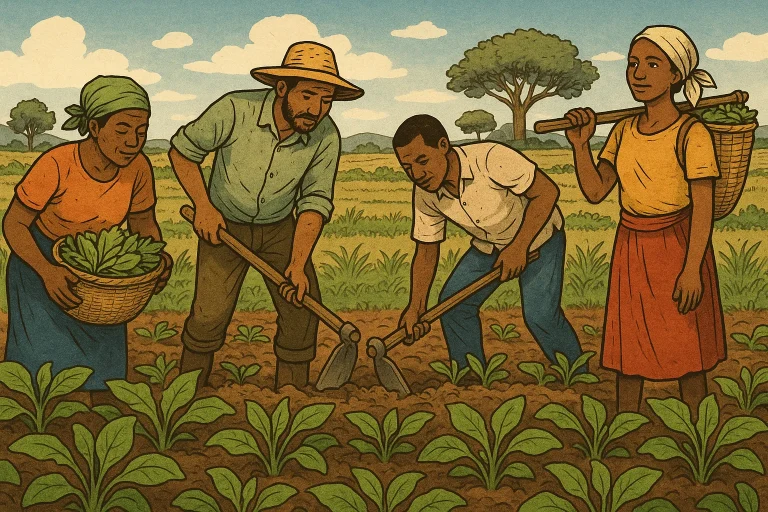This year’s Africa Food Systems Summit 2025, in Dakar, Senegal, focuses on Africa’s smallholder farmers – and youth and women, and how they can lead collaboration, innovation, and the implementation of agri-food systems transformation for a stronger and more resilient food value chain.
It is estimated that some 500 million smallholder farmers around the world produce 35–46 percent of the world’s food, helping feed just over 8 billion people living on our fragile planet.
Smallholder farmers are crucial for global food security. But how can their agricultural practices become more sustainable and safer—reducing contamination of food and feed with mycotoxins and pesticide residues? How can they protect themselves and the environment from pesticide risks? And how can young people drive transformation?
Risks to humans, livestock and the environment
Aflatoxins are poisonous carcinogens, primarily linked to liver cancer in humans. They also cause reduced milk production, impaired reproduction, and liver disease in livestock.
Chemical pesticides contaminate water, soil, and air, leading to biodiversity loss, algal blooms, and fish kills, while moving up the food chain.
For humans, pesticide exposure is linked to chronic illnesses including cancer and neurological diseases, with occupational exposure posing serious risks to farm and abattoir workers.
It is clear that broader risks to livestock, ecosystems, and humans must be addressed if we are to achieve safe and sustainable agricultural production.
Youth and women as key players
Young men and women are central to the future of agriculture, where challenges to safe food production must be overcome to reduce significant health burdens.
Economic losses also occur through lost export trade and reduced competitiveness in the agri-food sector. To address these challenges, we need stronger policies, capacity building, technology adoption, and coordination across agriculture, health, environment, and trade sectors.
In essence, a One Health approach is needed—recognising the interconnectedness of human, animal, plant, and ecosystem health to prevent and manage foodborne risks. This requires collaboration across sectors and multi-sector strategies to ensure safe food from production to consumption.
Recognising farmers’ realities
We must recognise the realities of farmers, who must understand which pesticide to use, how to apply it safely, and how to protect themselves through proper Personal Protective Equipment (PPE).
The challenge is that safer, low-risk products are often not economically viable. Farmers sometimes rely on “nasty chemicals” just to secure produce they can sell at a profit.
As global food demand rises, farming practices will intensify, and pests will increase. Pesticides remain important tools, but they must be seen as just one part of an Integrated Pest Management (IPM) toolkit. More low-risk alternatives and supportive policies are needed to make sustainable practices viable.
Safe pesticide use safeguards food security
Careful pesticide use safeguards both food safety and long-term security. Using fewer pesticides also protects soil and water while conserving biodiversity, including pollinators.
In July 2023, the CABI-led PlantwisePlus programme, in partnership with the Centre for Behaviour Change and Communication (CBCC) and the Department of Agriculture, Nakuru County, Kenya, launched the Ukulima True initiative to reduce pesticide risks.
The initiative addressed unsafe pesticide practices, encouraged PPE use, and promoted safe spraying. Importantly, it engaged agrodealers, traders, elders, and young people—not just farmers—ensuring wider awareness and community champions for safe practices.
Youth driving integrated pest management
Young agro-input suppliers and microbusinesses are helping drive IPM by promoting biological pest control alongside responsible pesticide use.
In Kenya and Uganda, PlantwisePlus has trained youth to establish micro-businesses offering pest management advice, safe pesticide application services, and supply of agricultural inputs like biological products, seeds, fertilizers, PPE, and pesticides.
Similarly, in Zambia, CABI, the Zambia Agriculture Research Institute (ZARI), and the University of Zambia (UNZA), with support from the Australian Centre for International Agricultural Research (ACIAR), equipped young farmers to produce and market biological control solutions against fall armyworm. This not only helps control pests sustainably but also creates agribusiness opportunities for youth.
Recognising the role of women and youth
Women and youth remain on the margins of decision-making, with limited control over resources and often relegated to low-paying or unpaid roles in agriculture.
As noted by Kadzamira et al (2024) in CABI Agriculture & Bioscience, “Africa’s women and youth hold the key to the continent’s very survival and the burden to sustain wider global development.” For their effective engagement, multi-sectoral collaboration and long-term dedicated funding from governments and development partners are crucial.
Conclusion
Sustainable, safer, and secure smallholder farming is essential to feed a growing world. But it requires a shift: from chemical dependence to integrated solutions, from farmer isolation to community-driven action, and from marginalisation of youth and women to empowering them as leaders of transformation.
The future of food security rests on how well we support smallholder farmers—and how boldly we commit to safer and more sustainable agricultural systems.
Source: CABI


